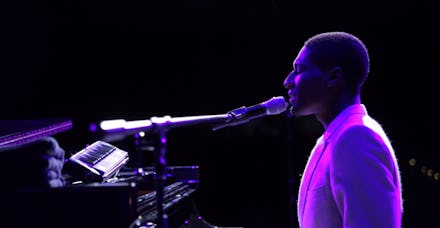Meet the Bandleader for 'The Late Show with Stephen Colbert'

Jon Batiste's idea of social music — music that brings strangers together — is coming to late night. Stephen Colbert named Batiste his Late Show bandleader, telling Entertainment Weekly, "his music makes the audience feel so good, we may have to install a 'Do Not Make Love' sign." In September, he'll be moving to CBS and The Late Show permanently when Colbert takes over as the host.
From a prominent music family that inspired its own HBO series, Batiste grew up immersed in the diverse New Orleans music scene. Batiste began his musical career playing the drums and switched to the piano with encouragement from his family when he was 11. He's been playing the piano ever since.
"If you're going to be great, you really have to go through a four- or five-year period of practicing eight hours a day or more and listening constantly," Batiste told Mic.
He studied piano and jazz at the Juilliard School and formed his band, Stay Human, shortly after graduation. Since then, he's been playing with his band, releasing albums — including one on the Billboard charts — and working as the artistic director at large for the National Jazz Museum in New York's Harlem neighborhood.
Batiste describes his idea of social music as an experience that brings strangers together through the power of harmony. Outside of his sold-out concerts, he's started love riots on the streets of New York on occasion to bring that idea to life.
"We go into the audience, bring them onstage or even take everyone on the street," Batiste said. "We call these moments 'love riots' because the energy is kinetic and big. It's people coming together who don't know each other, and that's so beautiful."
While a classically trained piano player, his signature instrument is the harmonaboard, a handheld keyboard with a harmonica mouthpiece. He uses this the most when he leaves the stage to join the audience or starts a love riot on a street corner.
At the National Jazz Museum, Batiste helps the museum reach new audiences for jazz music through programs and performances.
"Education has always been a big part of the music thing. Everyone that I admired at an early age was an educator," he said.
Batiste won't be slowing down anytime soon. His sold-out show at the Nomad in New York City is one telltale sign that social music is spreading fast. Despite his many commitments, he remains calm.
"Focus. I choose no more than three endeavors at a time and prioritize them accordingly," he said. "I also allow my instincts to guide me into seemingly impractical territory that oftentimes leads to creative discovery."